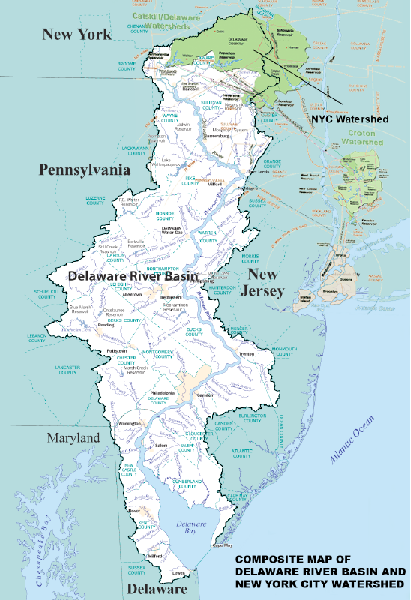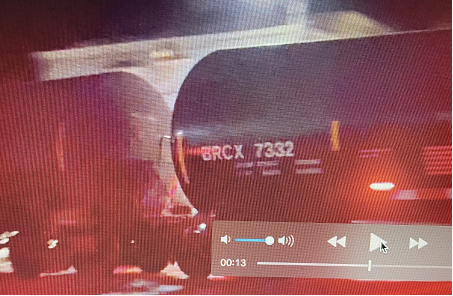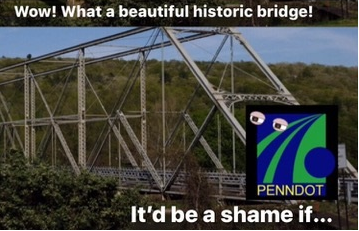
DCS Working to Make YOUR Skinners Falls Bridge Comments Count
February 9, 2022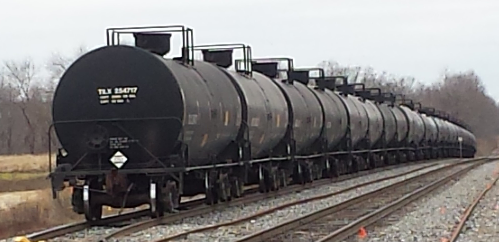
Stop LNG by Rail
March 22, 2022Toxic Radioactive Waste Imported into the Delaware River Basin? WHAT?
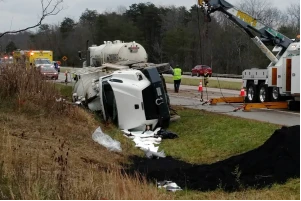
Overturned "Brine" Truck - Photo by Felicia Mettler
The Delaware River Basin Commission (DRBC) has proposed regulations that would allow toxic waste from fracking into the Delaware River Basin, and the export of water from the basin for fracking elsewhere. If we can avert that threat, it could be the thin edge of the wedge for similar victories for people everywhere who are suffering from the current or threatened impacts of fracking and its toxins.
If you live in an area where there is already fracking contamination, you can provide the DRBC with personal testimony of its impacts, e.g. in destroying water supplies or sickening livestock. That’s one of the strongest ways to get the DRBC to enact a ban on import of those toxins—and that could start the dominoes falling in just the right way to start bringing help back to you.
We’ve seen it before. A ban of fracking in one small area, NYC and its watershed, led to a ban in New York State as a whole. Other states and even some countries have followed. A ban of fracking waste importation and water exportation from the interstate area governed by the DRBC could have an even greater impact, especially among the member states like Pennsylvania. That means it is in the interests of everyone everywhere who is threatened by fracking and the contamination it causes to do what they can to make this ban happen. Right now, that means submitting comments to the DRBC [1] saying “don’t do it”.
How it happened before:
- In early 2008, with fracking just starting to boom, New York State modified its oil and gas regulations to accommodate fracking, and hearings were held as part of the regulatory SEQRA process required for approval. At first, industry and its experts dominated the hearings, and it looked like fracking might prevail all over the state—including the New York City watershed.
- Damascus Citizens for Sustainability[2] (DCS) believed that NYC was an ideal place to initiate statewide resistance, being a non-voting member of the DRBC. In keeping with that purpose, a group was formed named NYH20, which attended meetings of 59 of the 60 the community boards that effectively govern the city to educate them about the harms fracking would do. (The New York City council comprises representatives of those boards, and answers to them). All 59 subsequently passed resolutions opposing hydrofracking in the NYC watershed; about two thirds passed resolutions opposing drilling in the state as a whole.
- Even a strong pro-industry mayor like Bloomberg couldn’t ignore a vote like that. Instead, he instigated [3] the very first study taking a deep look at fracking and its environmental impacts. The conclusion of the report[4] is that there should be no drilling any closer than 7 miles from the border of the watershed. About a year later, NYC voted to ban drilling in its watershed.
- But it didn’t end there. The public awareness of the damage fracking could do, raised by the Hazen and Sawyer report, and people’s realization that they had the power to actually protect themselves had a domino effect. Municipalities in both New York and adjacent PA became active in developing zoning strategies to restrict or ban fracking. Thousands of people submitted comments opposing fracking in public hearings. New York’s governor Cuomo bowed to public pressure, and eventually issued a “no action” decision for the SEQRA study, with the effect of prohibiting it in the state. That was followed in 2020 by the passage of a NY law making that ban permanent.
DCS believes the regulations must be changed to a total ban of fracking waste import and water export. If all of us together can persuade the DRBC to make such a change, it would not be just a narrow victory for the river basin—it could be the means towards helping all faced with fracking and its impacts.
[1] https://dockets.drbc.commentinput.com/?id=x2K8A
[2] https://www.damascuscitizensforsustainability.org
[3] https://www.hazenandsawyer.com/work/projects/impact-assessment-of-natural-gas-production-in-the-nyc-water-supply-watersh/
[4] https://www.damascuscitizensforsustainability.org/2009/12/15/final-impact-assessment-report-of-natural-gas-production-in-the-new-york-city-water-supply-watershed/
